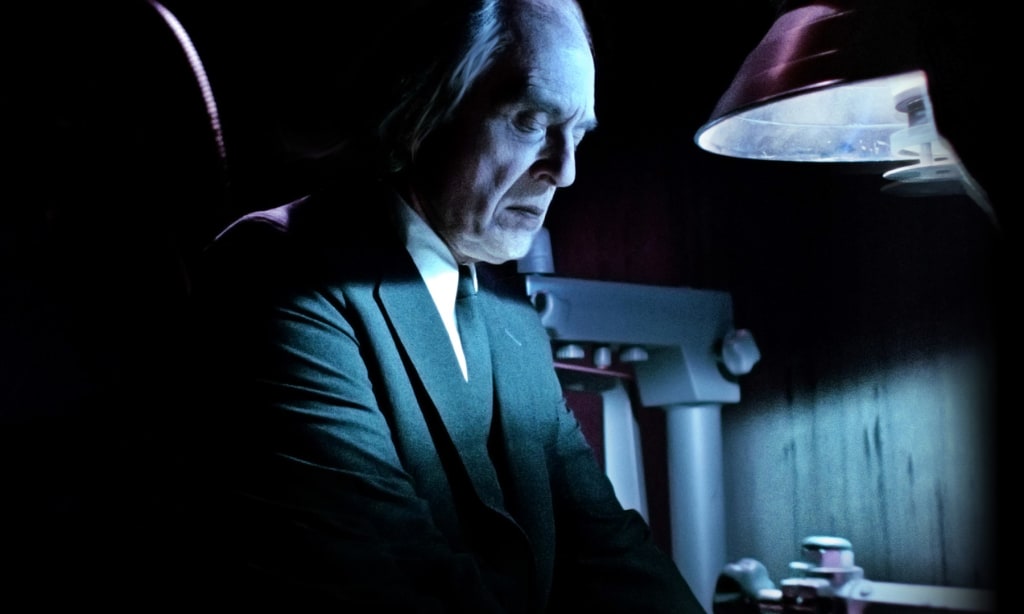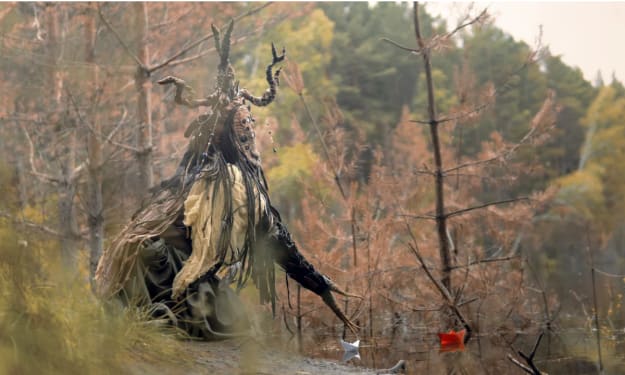The Sad, Sad Meaning Behind The Phantasm Series
A consideration of all five films and what they mean collectively.

I’m just going to put this out there, I don’t think the Phantasm series has any real intentional message or meaning. We are talking about a franchise that spawned from a film that was supposed to be a one-off. Writer and director Don Coscarelli has stated numerous times that he initially wasn’t interested in making a sequel to the 1979 film.
Does that mean we can’t ignore authorial intent? That we can’t look at the films as they are and extract our own meaning from them? Of course not. Coscarelli’s comments haven’t stopped fans from coming up with their own interpretations. They’ve certainly haven’t stopped me. What follows is simply another interpretation of the Phantasm series and what it appears to say. It is not the irrefutable answer that the clickbait title suggests (I’m sorry but I had to get you here somehow!)
My reading of the series is that it deals with absurdism, the unpleasant places you can end up by searching for meaning in the universe and what the alternatives are.
Death
When it comes to my interest in philosophy, I’m no wiser than most people. I like learning about big ideas but in small digestible chunks, hence I avoid big books and gravitate to short video essays. While browsing the net for idiot-proof summaries of certain philosophies, I discovered the works of American cultural anthropologist Ernest Becker and French philosopher Albert Camus. I’ll confess, I did a lot of reading between the lines when looking at their work but once I was familiar with the basics of their theories, the Phantasm saga appeared to me in a completely new light.
Most fans and critics agree that the Phantasm series concerns death and that the Tall Man is death incarnate. Angus Scrimm himself stated that he thought the Tall Man was a representation of the Grim Reaper. I’d argue that he represents something more but I’ll get to that.
In the first film, 13-year-old Mike is recovering from the loss of his parents. He becomes overly attached to his older brother Jody, following him everywhere he goes, terrified that he’s going to leave town without him. One day, while stalking Jody to a funeral, Mike witnesses something strange. He sees the local mortician lift a 500-pound coffin off the ground. Astonished, Mike investigates, unaware that that is the worst thing he could do.

Mike is at the age most are when we see death for what it is. Ernest Becker wrote in his book The Denial of Death that
“The idea of death, the fear of it, haunts the human animal like nothing else; it is a mainspring of human activity—activity designed largely to avoid the fatality of death, to overcome it by denying in some way that it is the final destiny for man.”
For the majority of the series, Mike exhibits the behaviour Becker describes. From the first film all the way up to Phantasm IV: Oblivion, Mike tries everything to stop the Tall Man i.e. avoid death. Yet throughout his crusade reality distorts, he can’t tell what’s real and what’s not, he makes friends only to lose them and whenever the Tall Man appears defeated, he returns.
Every time Mike tries, not only does he fail but he gets a little closer to becoming like the Tall Man.
I don’t know the full context of what Ernest Becker was saying here but I think the quote sums up Mike’s arc and part of Phantasm’s meaning pretty well:
“The person seeks to avoid death, but he does it by killing off so much of himself and so large a spectrum of his action-world that he is actually isolating and diminishing himself and becomes as though dead.”
The Tall Man became what he is by trying to avoid death. In Oblivion we learn that he was a mortician in the late 19th century who, after years of burying the dead, became obsessed with the notion of an afterlife and started searching for a doorway there. Ironically, in his search for life after death he in fact became death.
Mike goes on a similar journey, almost becoming the very thing he tried to avoid. In Oblivion not only does he manifest some of the Tall Man’s powers (telekinesis, being able to summon dimensional forks) but in a dream Reggie has (or possibly a glimpse into a parallel universe) Mike is the Tall Man.
Fortunately the fifth and final film in the series, Ravager, indicates that Mike avoids this fate and perhaps has come to terms with what the Tall Man really is.
The Absurd
I think an argument can be made that the Tall Man is not death but the universe incarnate. He is like God in that he is omniscient, omnipotent and omnipresent but he is like the universe in that he is cruel, deceptive and unjust.
Throughout the first four films he speaks of a game and plans that he has for Mike, yet in the final film he reveals that Mike was nothing but a “subject” and Reggie “an amusement.” I think the game he speaks of can be interpreted as a spin on the Christian concept of God’s Plan and his disclosure in Ravager as reality.
The Tall Man is Albert Camus’ the absurd manifest, he suggests meaning yet demonstrates chaos.
I think a good example of his absurdist nature is his relation to the fortune-teller, who features in the first film. In a scene straight out of Frank Herbert’s Dune, young Mike approaches the fortune-teller shortly after witnessing the Tall Man’s inhuman strength at the cemetery. She advises Mike to not fear, giggling after he leaves. While this strategy initially works for Mike as he and Jody trap the Tall Man in a mine shaft, it doesn’t in the long run as the Tall Man reappears and kidnaps Mike. In Oblivion the fortune-teller returns, appearing before an adult Mike, giggling. She was nothing but an agent of the Tall Man’s, enticing Mike with a strategy that was doomed to fail.

So far this is a pretty bleak reading of the series, after all it pretty much says that Mike has wasted most of his life fighting a battle he was never going to win. However, there is hope and to find it all we have to do is return to Ernest Becker and consider the character of Reggie.
Heroism
In The Denial of Death Becker seems to outline a solution to the existential dilemma of death. He suggests that people should try to be heroic, embark on their own hero’s journey, be a part of something bigger than themselves and create something that will last long after they’re gone. Becker admits that this approach has its problems as not everyone can be Winston Churchill or Pablo Picasso, but he stresses that it’s a worthy endeavour for everyone as, in his words:
“It is still a mythical hero-system in which people serve in order to earn a feeling of primary value, of cosmic specialness, of ultimate usefulness to creation, of unshakable meaning.”
I believe that this is Reggie what does in the series. Unlike Mike, he doesn’t really seem interested in destroying the Tall Man. After losing his wife and daughter in Phantasm 2, revenge motivates him to hunt the Tall Man but as time passes, I think he settles on just trying to protect Mike, to keep the promise he made in the first film. That’s his goal, his purpose. For Reggie The Tall Man becomes more of an unstoppable force of nature to avoid rather than a target to hit.
As a result, Reggie’s arc has less losses than Mike’s and leads him to a place he desires; with his friends.

I know the fan response to Phantasm Ravager was pretty mixed. I won’t lie, when I first saw it I felt disappointed. However, after many rewatches of the first four films and learning of Becker and Camus’ ideas, Ravager looks like the best possible conclusion for the series. It’s not the epic Return of the Jedi-like finale fans wanted but the closure of the characters and themes the previous films explored.
In the end, I think the Phantasm saga says that we shouldn’t expect any great purpose in the universe because if there was one, it would be even more vicious and cruel than the universe itself. Instead we should focus on what we have and try to protect it, whether it be our loved ones from death or ourselves from despair.
This is no way a solid, completely researched essay. Like I stated before, I did a lot of reading between the lines. However, I do think I’ve brought up topics that’ve never been considered in discussions of Phantasm. I’ve read plenty of articles on what the films say about dreams and death but almost nothing on the Tall Man’s God-like character.
Maybe those articles are out there and I just not noticed them. If they are and this piece is teeming with points that’ve already been made a hundred times, then I at least hope that I’ve exposed people to the wonderful, thought-provoking and unique franchise that is Don Coscarelli’s Phantasm.
About the Creator
Luke Duffy
This is where I write serious stuff, for regular, less formal content visit my blog ( https://duffhood.wordpress.com).
I've also got twitter (@LukeDuffy19) and a YouTube channel (just search Duffhood).
See you around!






Comments
There are no comments for this story
Be the first to respond and start the conversation.